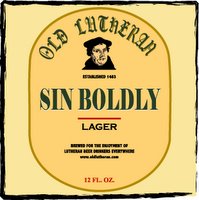"God has saved us and called us to a holy life--not because of anything we have done but because of his own purpose and grace. This grace was given us in Christ Jesus before the beginning of time, but it has now been revealed through the appearing of our Savior Christ Jesus, who has destroyed death and has brought life and immortality to light through the gospel. And of this gospel I was appointed a herald and an apostle and a teacher." (2 Timothy 1:8-11)
Wednesday, January 25, 2006
Liberals, liberation, and another Elvis sighting*
Then, last month, I read a wonderfully thought-provoking little book by some leading evangelicals in the field of hermeutics (the process of interpreting Scripture for modern contexts) titled Beyond the Bible: Moving From Scripture to Theology (Baker Academic, 2004). It has helped me to become aware of how incredibly important thinking about theology is for every decision we make today (and by what methods we go about doing that). Pepsi has produced new cans printed with the Pledge of Allegiance, but without the words "under God." Most evangelicals would raise a stink about this, but I'm not really one to waste my energy in such an inconsequential and unwinnable battle. But what I did begin wondering is whether or not I can even honestly say, "I pledge allegiance to the flag and to the United States of America and to the republic for which it stands." After all, Paul writes that our "citizenship is in heaven" (Philippians 3:20). And how would I go about forming a biblical theology concerning pacifism/involvement or euthanasia or capital punishment or contraceptives or stem cell research? My personal jury is currently hung on all of these issues.
In the midst of this, part of me begs the difficult question, Is it possible to have pure interpretation of Scripture apart from any philosophical presuppositions? Take Bultmann, for example: his NT theology developed strongly from the existentialism of Martin Heidegger. Or Moltmann with marxist Ernst Bloch. I look at my own opinions regarding the Bible and see clearly that I believe certain things: the Bible contains absolute propositional claims and is a factual record of God's work in history. This stands opposed to much of the liberal theology built around the Bible as personal or community records of their own experience of God, as communicated through images and metaphor. (But what do we do with the ends of history and the Scriptural communiques concerning creation [Genesis 1-11] and re-creation [The Revelation]? After all, even Bonhoeffer wavered over the literal existence of an Adam and Eve [see his Creation and Fall]. And I'm still not sure about Jonah.) Likewise, I know I have presuppositions governing my view of science.
And then what do you make of Barth, the champion of neo-orthodoxy, who says that the Bible is not actually the revelation of God (for Scripture is finite and the product of fallen, finite man), but rather the record of the revelation of God to men whom he inspired? Barth says that because God is "wholly other" and transcendant to mankind and creation, although Scripture can express God in human concepts, it does not truly reveal God himself. However, in his sovereign freedom and love, God does reveal himself through this human expression in the preaching of the written Word.
Anyway, this has left me with a lot of questions that hang uneasily in my mind right now, forcing me toward prayer and gratitude that my acceptance and security before God rests in his might and love in Christ rather than in my strength of faith. "Faith, if it ever is to be a noun, is properly the whole play, from the first scene to the last" (Walter Wangerin, Jr.).
_____________________________________
*For a primer on proto-liberal Christianity, please see Rob Bell's new book, Velvet Elvis. From what I've read of it so far--and I'll admit it's not much--Bell is well-intentioned but wrong.
** I say "Christian faith" because some of these men are considered to belong to the "liberal" camp, with Christologies and/or views of Scripture that diverge from orthodox Christianity.
Wednesday, January 18, 2006
When it's good to be self-centered
__________________________________
*I am in no way saying that the opinions of Pat Robertson or The 700 Club are necessarily aligned with biblical judgments on the ways and purposes of God.
**The Greek eudokia ("good pleasure"; NASB "kind intention", but see margin notes) has the meaning of a purpose, intention, or desire in which its author finds pleasure or satisfaction (cf. Matthew 11.26; Luke 2.14; 10.21; Romans 10.1; Ephesians 1.5, 9; Philippians 1.15; 2.13; 2 Thessalonians 1.11).
Friday, January 13, 2006
Kurban Bayramı

According to popular Islam, there is a "narrow bridge" that all must cross is they wish to get to Paradise and receive Al'lah's mercy. From what I can gather from the Qur'an and from other Muslims, this mercy is based upon what Muslims do to prove themselves faithful (the "five pillars": Ramadan fasting, daily ritual prayer, almsgiving, confession of their monotheistic faith, and pilgrimage to Mecca) and what they do to please Al'lah. One thing many people believe is that a way across this narrow bridge includes animal sacrifice. The sacrificed animal will carry you on its back across the bridge, and so you will safely make it across.

For the holiday, Muslims will purchase either a "large-headed" animal (cows and camels) or a "small-headed" one (rams and goats). All I've seen here are rams, althought I've seen what I think are cow legs on the ground. Then, while holding the animal's head to the ground facing Mecca, its throat is slit, and its meat is cut up and given to families who've purchased it. At least one-third of the meat is to be given to the poor and needy, much like during the Ramadan fasting.
At Christmastime I was talking about candy canes with a friend of mine here. I told him how the thick red stripe represents Jesus' shed blood, and the stripes are the whipmarks, a constant reminder that Jesus came into this world not only to preach the kingdom of God, but also to be a kurban, a lamb slaughtered to bear our pains and bring us healing:
Surely our griefs He Himself bore,
And our sorrows He carried;
Yet we ourselves esteemed Him stricken,
Smitten of God and afflicted.
But He was pierced through for our transgressions,
He was crushed for our iniquities;
The chastening for our well-being fell upon Him,
And by His scourging we are healed.
All of us like sheep have gone astray,
Each of us to his own way;
But the LORD has caused the iniquity of us all
To fall on Him. (Isaiah 53.4-6)
"Blood? That's disgusting! How can you give candy canes to children?" The cross will always be a stumbling block. "Well, isn't the Sacrifice Festival awful bloody?" "Yes, but we don't let little children watch it, and it's not a human."
Isaac laboring up Mount Moriah, bearing the wood for the sacrificial pyre upon his back ... His father willing to bring down the knife on his only son ... An innocent Jewish rabbi laboring up Skull Hill, bearing his wooden cross ... His Father, no substitute ram in sight this time, putting to death his only Son ...
"Now [Caiaphas] did not say this on his own initiative, but being high priest that year, he prophesied that Jesus was going to die for the nation, and not for the nation only, but in order that He might also gather together into one the children of God who are scattered abroad" (John 11.51-52).
How on Earth can Islam claim to be the final revelation of God for all peoples? Goats, camels, rams, and sheep don't live everywhere on the earth. How can the natives of Borneo or the Pacific Northwest obtain such animals to please Al'lah and cross the bridge? How can they make the hajj to Mecca? I don't care what they try to say, Islam is a religion which, in its purest expression, is geographically limited. God destroyed Jerusalem in A.D. 70 to prove that his kingdom would not be only for the Jews, but rather for all the nations of the world. The gospel knows no geographical or ethnic boundaries, for the risen Christ is Lord over the whole world, not a local moon-god like Al'lah (hence the crescent as the symbol of Islam). Praise God for his mercy upon the world.
Wednesday, January 11, 2006
My wish list
 If you know me, you know I have a weak spot for good beer, with my current favorites being Samuel Adams Boston Lager and Bell's Best Brown Ale. A while back I stumbled across the crazy Jell-O-eating Norwegians at Old Lutheran. When I saw they make a beer called Sin Boldy Lager, well, I about keeled over in euphoria. Of course, ol' Martin is known for his infamous and oft misunderstood "Be a sinner, and sin boldly, but trust in Christ more strongly still, and rejoice in him who is the Victor over sin, death, and the world." But did you know that he also once said, "Who loves not women, wine, and song remains a fool his whole life long"?
If you know me, you know I have a weak spot for good beer, with my current favorites being Samuel Adams Boston Lager and Bell's Best Brown Ale. A while back I stumbled across the crazy Jell-O-eating Norwegians at Old Lutheran. When I saw they make a beer called Sin Boldy Lager, well, I about keeled over in euphoria. Of course, ol' Martin is known for his infamous and oft misunderstood "Be a sinner, and sin boldly, but trust in Christ more strongly still, and rejoice in him who is the Victor over sin, death, and the world." But did you know that he also once said, "Who loves not women, wine, and song remains a fool his whole life long"? Now what good is 16 ounces of a refreshing ale without a container from which to drink it? Hence one of my favorite things is the pint glass (hint, hint). Now cycling and beer go together like ham and cheese (or, here in Turkey, cigarettes and mayonnaise), so when my eyes glanced upon this argyle-wearin' beauty-on-a-bike pint glass from Dirt Rag magazine, the salivating began. (No, it's not just because she's a cute girl on a bike! Although, ladies, that's a big bonus.)
Now what good is 16 ounces of a refreshing ale without a container from which to drink it? Hence one of my favorite things is the pint glass (hint, hint). Now cycling and beer go together like ham and cheese (or, here in Turkey, cigarettes and mayonnaise), so when my eyes glanced upon this argyle-wearin' beauty-on-a-bike pint glass from Dirt Rag magazine, the salivating began. (No, it's not just because she's a cute girl on a bike! Although, ladies, that's a big bonus.) To keep up with the flow of things, why not introduce you to my dream mountain bike: the Independent Fabrication Deluxe? These Massachusetts framebuilders know their craft. Full suspension bikes are great, but in forested, sandy Michigan, I think the hardtail is still where it's at. The Deluxe is one helluva sweet piece of steel--and it had better be, at $1400 for the frame alone. (The complete bike, tricked out like I'd like, would run about $3800.) IF bikes simply have soul, and isn't that what mountain biking is all about, anyway? I even have my dream paint job all picked out : a sparkly, deep black cherry, with autumn leaves hand-painted on near where the seat tube, top tube, and seatstays intersect.
To keep up with the flow of things, why not introduce you to my dream mountain bike: the Independent Fabrication Deluxe? These Massachusetts framebuilders know their craft. Full suspension bikes are great, but in forested, sandy Michigan, I think the hardtail is still where it's at. The Deluxe is one helluva sweet piece of steel--and it had better be, at $1400 for the frame alone. (The complete bike, tricked out like I'd like, would run about $3800.) IF bikes simply have soul, and isn't that what mountain biking is all about, anyway? I even have my dream paint job all picked out : a sparkly, deep black cherry, with autumn leaves hand-painted on near where the seat tube, top tube, and seatstays intersect. While America is known as the home of mountain biking, road cycling has its traditions in the coastlines of Italy, the fields of France, and the cobblestones of Belgium. And while the Colnago C50 is one sweet bike, I'm an American, and American cycling is on the rise. Once again, gimme a road bike by Indy Fab: their steel Crown Jewel. Steel bike frames may be old-school, but they're durable, lively, and easy to repair. Once again, the frame will set me back about $1600, but I'm only dreaming. Rock 'n' roll.
While America is known as the home of mountain biking, road cycling has its traditions in the coastlines of Italy, the fields of France, and the cobblestones of Belgium. And while the Colnago C50 is one sweet bike, I'm an American, and American cycling is on the rise. Once again, gimme a road bike by Indy Fab: their steel Crown Jewel. Steel bike frames may be old-school, but they're durable, lively, and easy to repair. Once again, the frame will set me back about $1600, but I'm only dreaming. Rock 'n' roll. Call it the mark of the beast or whatever you wish, but iPods are just plain cool. And they're also $300 that I don't have. But sitting on public transportation for up to three hours per day would be a lot better if accompanied by more than just one CD. I wouldn't mind reading, either, if I didn't have to stand for much of the time while getting jostled around on a minibus. Blech. I suppose I could justify it by saying I'll use it to listen to sermons while traveling.
Call it the mark of the beast or whatever you wish, but iPods are just plain cool. And they're also $300 that I don't have. But sitting on public transportation for up to three hours per day would be a lot better if accompanied by more than just one CD. I wouldn't mind reading, either, if I didn't have to stand for much of the time while getting jostled around on a minibus. Blech. I suppose I could justify it by saying I'll use it to listen to sermons while traveling.(In case you can't tell, I have the week off due to campuses being closed for Kurban Bayrami, the Sacrifice Festival commemorating Abraham's willingness to sacrifice Ishmael. I've been blogging like a fiend.)
Tuesday, January 10, 2006
Let the high praises of God be in our mouths
"They said to the mountains and to the rocks, 'Fall on us and hide us from the presence of Him who sits on the throne, and from the wrath of the Lamb; for the great day of their wrath has come, and who is able to stand? ... After these things I looked, and behold, a great multitude which no one could count ... standing before the throne and before the Lamb, clothed in white robes and palm branches were in their hands" (The Revelation 6.16-17; 7.9).
A day is coming--it's in motion already--when Jesus the King will be revealed in flaming fire with all his angels (Matt. 25.31; 2 Ths. 1.7-10). I don't know what it will look like, though the Son of Man promises to come as stunningly and obviously as lightning that lights up the dark skies from one horizon to the other (Matt. 24.27). There are "myriads of myriads, and thousands of thousands" of heavenly host who will all come and fill the skies. Could they look like flaming nightmares, with white, streaming hair and swords of such flame that no man can bear the sight (Rev. 9)? Surely it will be so for many. But what a welcome sight of beauty they will be for us who have believed!
The world is getting worse, eventually to the point when utter chaos and hopelessness will reign in our sight, and the chorus of man will be, "Who can stand?"
Yet in the face of this there is, in fact, a true hope: some, even a great multitude, do stand before the throne and the Lamb! Who are such people? In addition to the angels (7.1, 11) they are the people purchased by the Lamb's blood and sealed with his mark (7.2-8; 9.4; cf. Ezek. 9.4). The 'sealing' of Christ's purchased saints is more than sufficient to withstand the day of history's awful 'unsealings' (Rev. 6.1 - 8.5). It allows us to stand, to withstand all of evil and judgment. For his blood has washed us of our iniquities (1.5; 7.14) and has bought for us faith and the Holy Spirit.
It is on this hope that Paul writes, "No matter how many promises God has made, they are 'Yes' in Christ. And so though him the 'Amen' is spoken by us to the glory of God. Now it is God who makes both us and you stand firm in Christ. He anointed us, set his seal of ownership on us, and put his Spirit in our hearts as a deposit, guaranteeing what is to come" (2 Cor. 1.20-22, NIV).
What is Paul's response to the Messiah, who has become our righteousness and sure anchor of hope before God? He proclaims "Amen!" to God's glory: he worships! And that is exactly what those standing before the God of glory do: they shout praises and sing hymns, longing for the truth of God the Just and God the King to become ever more manifest in the earthly sphere. That's the resounding "Amen!" and "It will be so!" Sometimes it's in a painful longing: "How long, O Lord, holy and true ...?" (6.10). But all the while they know the end: Christ will reign with an iron scepter and with peace and love and equity for all eternity (11.15-17). So it is the worshiping, praying, waiting community, indwelled by the Spirit and living in his fruitfulness (Eph. 5.18-21), that stands and will stand until the glorious completion of this age. (And it's a completion, not an end merely: God's redemptive plan is moving somewhere, blown by the wind [pneuma] of his Spirit. It is not a terminus, but rather a new beginning of eternity that is approaching us with unstoppable momentum.)
O Jesus, how can we not pray? How we not praise? It is our life, our hope, our great privilege to participate in this triumph you have wrought.
Reading on in the Apocalypse, I see God bring together more threads. In chapter 12, upon Jesus' birth the dragon gets unceremoniously dumped to the earth, a sore loser. God is setting up his unending, covert victory parade in--seriously?--the birth of a little boy laid in a stone feed trough. The downfall of Satan and the world becomes ever the more sharp and decisive in the death of the Lamb (John 12.31). Even I still balk in disbelief--sometimes even a bit of disappointment, perhaps--that God chooses such humble means to bring about his salvation work here on Earth. He even calls today's kingdom-deeds "small things" (Zech. 4.10).
But the glorious fulfillment is coming. Bricks of God's temple are getting fitted into a structure, a paradigm--a kingdom--of heretofore unseen and unfathomed beauty and radiance where everything good will be seen and known and felt in the face of Christ.
Even now God invites us to participate in what he's doing in the downfall of evil and in the spread of his renown (Luke 10.17-20; Acts 1.5-8). Somehow, some way, our actions and prayers matter and influence and take part in the history of the cosmos that has been decreed to pass according to the minutiae of God's unalterable will (Eph. 1.9-11). This is clear from Rev. 8.1-5 and 12.11 and the Lukan text. Yet it's never about us or what we do. It's about God and what he has said, is saying, and will say; what he has done, is doing, and will yet do. The only right and enduring response is worship. Even Jesus acknowledged this: "Nevertheless, do not rejoice in this, that the spirits are subject to you"--what we're doing--"but rejoice that your names are recorded in heaven." Eugene H. Peterson writes in Reversed Thunder: "Their work was ancillary to his [Jesus']; to keep their focus sharp, they should aim their rejoicing at his accomplishment on their behalf. We are the recipients and participants in salvation, not its makers and shapers." *
It's inescapable: the call to worship beckons to all of us in all stages, in all places, in all circumstances. It's what fixes our eyes on our one sure hope: the risen Lord Jesus Christ. It keeps us in tune with the Almighty God who declares and who judges, who shapes and who saves. Those who don't worship and fight for faith and seek God's mercy and his Spirit lose focus. They fall for the sellouts that promise so much but deliver so little. That is the 'mark of the beast,' the 666. It's lack of worship that makes us run after unnecessary 'oil and wine when we clearly don't get our needed nourishment of 'wheat and barley' (Rev. 6.6). It's no wonder that the chief act of God's holy people in the Apocalypse is worship. It keeps them--and us--sane and ordered, focused on what we have and what is to come in Christ from God's giving hands, rather than on what we think we lack. Worship and thanksgiving allow us to say and see, "I belong," not "I need more belongings." They allow us to say, "Even when are faithless, he remains faithful, for he cannot deny himself." They give us direction--God--and not a chaotic fretting and pursuit of empty desires and false securities.
In light of this, it's a wonder how muted and dulled, how vapid my worship and desire to truly see God is. When was the last time I voiced--let alone shouted--praises to God my Savior with my roommates, in my prayers, or in the assembly? I can't think of it. Father, I know David wasted away when he held back speaking the good (Ps. 39.2). It's a fight, it's a knock-down, bare-knuckle fight for faith and joy, and because I'm part of the same church as the apostle John's, the same called and chosen and faithful ones who've overcome through Jesus (Rev. 17.14), I must and will praise you with words, my heart, my mind, my daily living.
The LORD takes pleasure in His people;
He will beautify the afflicted ones with salvation.
Let the godly ones exult in glory;
Let them sing for joy on their beds.
Let the high praises of God be in their mouth,
And a two-edged sword in their hand.
(Psalm 149.4-6)
________________________________
*Eugene H. Peterson, Reversed Thunder: The Revelation of John & the Praying Imagination (New York: HarperCollins, 1988), 161.
Monday, January 9, 2006
On apostasy and 'the last hour'
"Children, it is the last hour; and just as you have heard that antichrist is coming, even now many antichrists have appeared; from this we know that it is the last hour. They went out from us, but they were not really of us; for if they had been of us, they would have remained with us; but they went out, so that it would be shown that they all are not of us" (John the Elder, reassuring his congregation at Ephesus about Gnostic deceivers within the church, c. A.D. 90).
I never cease to be amazed when I read either of these passages at how exactly what Paul predicted would happen in Ephesus did in fact come true: Gnostic apostates arose from within the church and left, trying to draw away the young and unstable. Even as it was in John's days, it is yet "the last hour", when "false Christs and false prophets will arise ... in order to lead astray, if possible, the elect" (Mark 13.22). This is crazy to think of how imminent Jesus' return in glory is.
Over the past few years here in Turkey, there have been some pastors who've done the same, renouncing their profession of Christian faith and returning to Islam. The latest has just happened a few weeks ago. (Nevermind the date on the TDL article nor its hazy usage of quotation marks and lack of clarifying statements.) Two years ago, a pastor with many connections who reverted back to Islam made known vital information about most of the missions organizations here and the people working for them. Please pray for the church's safety here, that the lies being spread by the newest pastor will not harm local believers nor those working to spread the good news of Jesus Christ our King.
My first reaction at people like this is a sense of anger: How can they do such a thing? How can they forsake the goodness of God and the wonderful cross of Christ? But then I forget that it is only by God's sustaining grace that my faith in the gospel remains: "By the grace of God I am what I am" (1 Cor. 15.10). Blessed be God for turning this bad event into a source of encouragement for me and his church to further cling to his free and sovereign grace!
Sunday, January 8, 2006
Christian ecology
As God's redeemed "new creations" and kingdom-workers, our new life in Christ involves regaining the image fractured by the Fall (Col. 3.10). Does it not follow that we ought to regain our status as nature's caretakers?
My friend Dan has a t-shirt bearing the slogan "Forget the trees; save the kids." This of course reflects God's priorities. But are we really to neglect nature? Surely not. After all, nature also serves as an image-bearer of God (e.g., Ps. 19.1; Rom. 1.20) and exists for God's pleasure and praise (Ps. 148). Biblically, the bestowal of blessing comes in the form of rain, snow, milk and honey, goats and sheep, and fruitful crops. And how can we rightly respect, teach, and learn from Jesus' teaching that points to "the lilies of the field" (Matt. 6.28) if they're unhealthy or fail to even exist for future generations?
As I think more about a career as a biology teacher, the more excited I get about environmental bio and related sciences (e.g., geology and geochemistry). Ecology has always been my favorite branch of the sciences; perhaps this is why! With the desire of leading students to a greater understanding and appreciation of the world around them and how they can--and do--influence it, even that plays a role in restoring the world and spreading the kingdom of God into every niche (pun intended; but then again, you won't get the joke if you're not an ecologist). How much more should the church value and encourage those in forestry, agricultural sciences, geology, or wildlife conservation! What about people within the church starting a recycling group or helping to pick up roadside trash or restore a habitat through removal of an invasive weed (such as the ubiquitous purple loosestrife)? The Fall was pervasive; no corner was spared from being "subjected to futility ... and slavery to corruption." Should we not also, in regaining our pre-Fall image and God-ordered life, take seriously our responsibilities as those entrusted with the care of all living things?
(Incidentally, this comes at a time when I've been praying for God's direction for my future, particularly with reference to this coming fall. To teach, or not to teach: That is the question.)
P. S. -- Iz, if you're reading this, keep rockin' that garden of yours to the glory of God!
Wednesday, January 4, 2006
"God damn the black night ..."
Either Jesus or the apostle John (it's not totally sure; I favor the latter) is recorded as saying that "men loved darkness instead of light because their deeds were evil. Everyone who does evil hates the light, and will not come to the light for fear that his deeds will be exposed" (John 3.19-20, emphasis mine because I think fear is the most crippling thing in our lives). Some fundies will get all super twisted and make it seem like "the unbelievers" totally run and reject even the notion that we can be sinful or that something's wrong with them. But check out these lyrics from "We Looked Like Giants" by Death Cab For Cutie:
God bless the daylight, the sugary smell of springtime
Remembering when you were mine
In a still suburban town
When every Thursday I'd brave those mountain passes
And you'd skip your early classes
And we'd learn how our bodies worked.
God damn the black night with all its foul temptation
I become what I always hated
When I was with you then
We looked like giants in the back of my gray subcompact
Fumbling to make contact
As the others slept inside ...
Do you remember the JAMC
And reading aloud from magazines?
I don't know about you, but I swear on my name they could smell it on me
I've never been too good with secrets.
No ...
How on Earth can Ben Gibbard write stuff like that? It just hurts how much we as people can know what's good and right, what we really desire deep down inside (verse 1), and then in our sin stumble into being the very Mr. Hyde we don't want to be. Or what about Adam Gardner of Guster when he writes, "When I speak I cross my fingers; will you know you've been deceived? I find I need to be a demon; a demon cannot be hurt" ("Demons"). No, the reality is that we do know we're disastrously deceptive and ruinous both to others and ourselves. The pain comes in finding a solution. It forces us to reckon with ourselves a whole lot more than building up layers of coping mechanisms.
Okay, so there was no real flow or point to this post, but it just cuts me in a weird way that all of us can know how screwed up we are, hating ourselves and longing to be restored and honest, yet all the while being passively okay with it if we can just get through another day.
Students of Scripture often wrestle with whether the apostle Paul is speaking from a pre- or a post-regeneration standpoint in Romans 7.13-25. But I think it's actually both, because I see the same struggle in everyone. Paul says, "I find this law [or principle] at work: When I want to do good, evil is right there with me. For in my inner being I delight in God's law; but I see another law at work in the members of my body, waging war against the law of my mind and making me a prisoner of the law of sin at work within my members. What a wretched man I am! Who will rescue me from this body of death?" Because by grace he knows his Savior, he can then exclaim, "Thanks be to God--through Jesus Christ our Lord!" It's difficult to think that so many of us--believers and unbelievers alike--all wrestle with these feelings, this inner twisting and wrestling. Along with Paul, I consider myself blessed to be able to say, "Thanks be to God!" because I know Jesus. And I believe that no one can know Jesus without God's free choice and enabling (Luke 10.21-22; John 6.44). On one hand, it makes me marvel at God's gracious, undeserved blessings upon me: that he has given me eyes to see Christ and ears to hear him. But although I concede that his wisdom is infinitely higher than mine, it still irks me that he chooses to only truly reveal his help and salvation to some people and put an end to their painful wondering, "Who will rescue me from this body of death?" We deal with an awesome, mysterious God (but not an abstract one!) for sure.
(On another note, though, it's a blessing to see that people don't simply fall into cut-and-dried categories of "prideful" and "humble" or those who run to the light and those who run away. I think it's slowly causing me to take every person as being really real, with a lot of the same yearnings for restoration that I sometimes feel. We're people, with complex emotions and fears, not robots. I can only pray that everyone in the church learns this, too.)